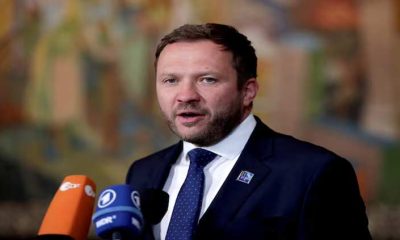Russian officials persisted Tuesday in saying Ukraine and the West had a role in last week’s deadly Moscow concert hall attack despite vehement denials of involvement by Kyiv and a claim of responsibility by an affiliate of the Islamic State group.
Without offering any evidence, Alexander Bortnikov, head of the Federal Security Service, or FSB, followed similar allegations by President Vladimir Putin, who linked the attack to Ukraine even as he acknowledged that the suspects who were arrested were “radical Islamists.”
The IS affiliate claimed it carried out the attack, and U.S. intelligence said it had information confirming the group was responsible. French President Emmanuel Macron said France also has intelligence pointing to “an IS entity” as responsible for the attack.
But despite the signs pointing to IS, Putin insisted on alleged Ukrainian involvement — something that President Volodymyr Zelenskyy rejected, accusing the Kremlin leader of trying to drum up fervor as his forces fight in Ukraine.
Bortnikov alleged that Western spy agencies also could have been involved in the deadliest terror attack on Russian soil in two decades, even as he acknowledged receiving a U.S. tip about the attack.
“We believe that radical Islamists prepared the action, while Western special services have assisted it and Ukrainian special services had a direct part in it,” Bortnikov said without giving details.
He repeated Putin’s claim that the four gunmen were trying to escape to Ukraine when they were arrested. casting it as a proof of alleged involvement by Kyiv.
But that assertion was undercut slightly by Belarus’ authoritarian President Alexander Lukashenko. who said Tuesday the suspects were headed for Ukraine because they feared tight controls on the Belarus border.
Russia is still reeling from the attack Friday in which gunmen killed 139 people in the Crocus City Hall, a concert venue on the outskirts of Moscow. Health officials said about 90 people remain hospitalized, with 22 of them, including two children, in grave condition.
The four men accused of carrying out the attack appeared in a Moscow court on Sunday on terrorism charges and showed signs of severe beatings. One appeared to be barely conscious during the hearing.
The men are citizens of Tajikistan, authorities said, and were identified as Dalerdzhon Mirzoyev, 32; Saidakrami Rachabalizoda, 30; Shamsidin Fariduni, 25; and Mukhammadsobir Faizov, 19. They were charged with committing a terrorist attack resulting in death, which carries a maximum sentence of life imprisonment.
A senior Turkish security official confirmed Tuesday that two of them spent a “short amount of time” in Turkey before traveling together to Russia on March 2.
One of the suspects, Fariduni, entered Turkey on Feb. 20, checked into a hotel in Istanbul’s Fatih district the next day, and checked out Feb. 27, the official said. The other, Rachabalizoda, checked into a hotel in the same district on Jan. 5, checking out on Jan. 21.
The official said Turkish authorities believe the two “became radicalized in Russia” because they were not in Turkey for long. There was no warrant for their arrest so they were allowed to travel freely between Russia and Turkey, the official said, speaking on condition of anonymity because he was not authorized to make public statements.
The Islamic State group, which lost much of its ground after Russia’s military action in Syria, has long targeted Russia. In October 2015, a bomb planted by IS downed a Russian jetliner over the Sinai desert, killing all 224 people aboard, most of them Russian vacationers returning from Egypt.
The group, which operates mainly in Syria and Iraq but also in Afghanistan and Africa, also has claimed several attacks in Russia’s volatile Caucasus and other regions in the past years. It recruited fighters from Russia and other parts of the former Soviet Union.
On Monday, Putin warned that more attacks could follow, alleging possible Western involvement. He didn’t mention the warning about a possible imminent terrorist attack that the U.S. shared confidentially with Moscow two weeks before the raid.
Three days before the attack, Putin denounced the U.S. Embassy’s March 7 notice urging Americans to avoid crowds in Moscow, including concerts, calling it an attempt to frighten Russians and “blackmail” the Kremlin ahead of the presidential election.
Bortnikov said Russia was thankful for the warning but described it as very general.
“The information about preparations for terror attacks in large gatherings of people was of a general nature,” he said. “Of course, we reacted to that information and took corresponding measures to prevent such incidents.”
He added that the FSB acted on the tip, targeting a group of suspects he didn’t identify but which eventually proved false.
“We are thankful, of course, but we would like to see more specifics,” Bortnikov said.
Post Views: 28


 Sports3 months ago
Sports3 months ago
 Fashion2 months ago
Fashion2 months ago
 Sports3 months ago
Sports3 months ago
 pakistan3 months ago
pakistan3 months ago
 pakistan3 months ago
pakistan3 months ago
 World2 months ago
World2 months ago
 World3 months ago
World3 months ago
 Sports2 months ago
Sports2 months ago




















